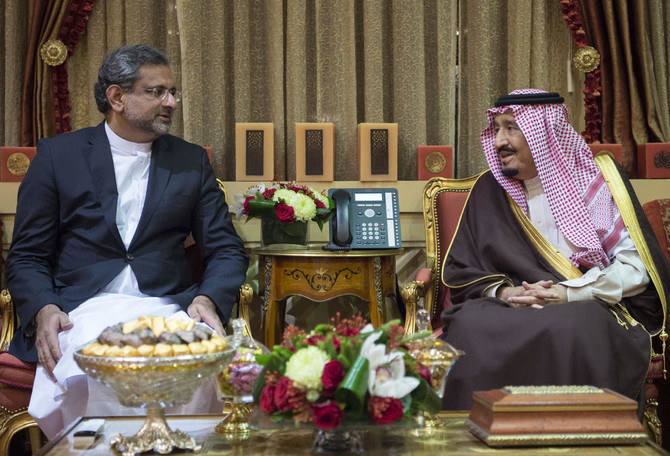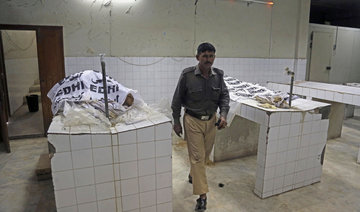ISLAMABAD: Pakistan’s political and military leadership has lauded the efforts of Saudi Arabia in bringing peace and stability in the region.
Prime Minister Shahid Khaqan Abbasi also praised Crown Prince Mohammed bin Salman’s vision in launching the economic transformation plan Vision 2030 and offered his country’s help in achieving it.
Abbasi and his team returned to Pakistan in the small hours of Tuesday after a day-long visit to the Kingdom. He was accompanied by Foreign Minister Khawaja Muhammad Asif, Chief of Army Staff Gen. Qamar Javed Bajwa and Director General of Inter Services Intelligence Lt. Gen Naveed Mukhtar.
The Pakistani prime minister and his team held meetings with King Salman and the crown prince during the visit.
According to an official statement from the prime minister’s office, the premier “lauded the efforts of the Saudi leadership in bringing peace and stability in the region and assured Pakistan’s full support in this regard.”
King Salman also praised Pakistan’s efforts in rooting out the menace of terrorism and extremism from its soil.
An official statement issued by Pakistan after the visit, available with Arab News, said that during the meeting with the crown prince, Abbasi praised his vision for launching Vision 2030, the national economic transformation plan, and offered Pakistan’s technical and human resource assistance in achieving it.
The Pakistani leadership appreciated the efforts and dedication of the crown prince in launching a unified platform of Muslim countries in the form of the Islamic Military Counter Terrorism Coalition (IMCTC), “for countering the menaces of extremism and terrorism that were distorting the real essence of Islam,” the statement said.
The visit took place a day after the inauguration of Islamic Military Counter Terrorism Coalition (IMCTC) — a 41-nation coalition against terrorism.
Pakistan’s Defense Minister Khurram Dastgir Khan represented the five-member Pakistani delegation. He said Pakistan was ready to share its experience and capabilities in all four main domains of counter-terrorism.
Pakistan’s former army chief Raheel Sharif, military commander of the IMCTC, emphasized during the defense ministers’ meeting that the coalition’s sole objective is to fight against terrorism.
“The visit of the Pakistani delegation to Saudi Arabia was very important. Pakistan wants to cooperate with the Muslim world to eliminate terrorism,” foreign relations analyst Rashool Buksh Rais told Arab News.
Lt. Gen. (Retired) Abdul Qayyum, a member of Pakistan’s Senate, told Arab News that Islamabad has long-standing close ties with Riyadh. “Pakistan is worried about the tension in Middle East and we want to play a role in bridging gaps between Saudi Arabia and Iran,” he said.
This was the second visit of the Pakistani premier to Saudi Arabia, his first being the maiden visit after assuming office in August this year.
Pakistan and Saudi Arabia enjoy close ties. The two countries signed a Treaty of Friendship in 1951 which lays the foundation their bilateral relations.


Pakistan lauds Saudi efforts to bring peace in region
Pakistan lauds Saudi efforts to bring peace in region

Prince Faisal holds talks with Egyptian foreign minister at WEF

- Saudi foreign minister also meets with the Palestinian prime minister
RIYADH: Saudi Arabia’s Foreign Minister Prince Faisal bin Farhan held talks with his Egyptian counterpart Badr Abdelatty on the sidelines of the World Economic Forum in Davos on Tuesday.
The ministers discussed developments in the region and a “number of topics of mutual interest,” the Saudi Foreign Ministry said.
Prince Faisal earlier met with the Palestinian Prime Minister Mohammad Mustafa, with the pair discussing developments in Gaza.
He also held talks with David van Weel, the Netherlands foreign minister.
© 2026 SAUDI RESEARCH & PUBLISHING COMPANY, All Rights Reserved And subject to Terms of Use Agreement.












